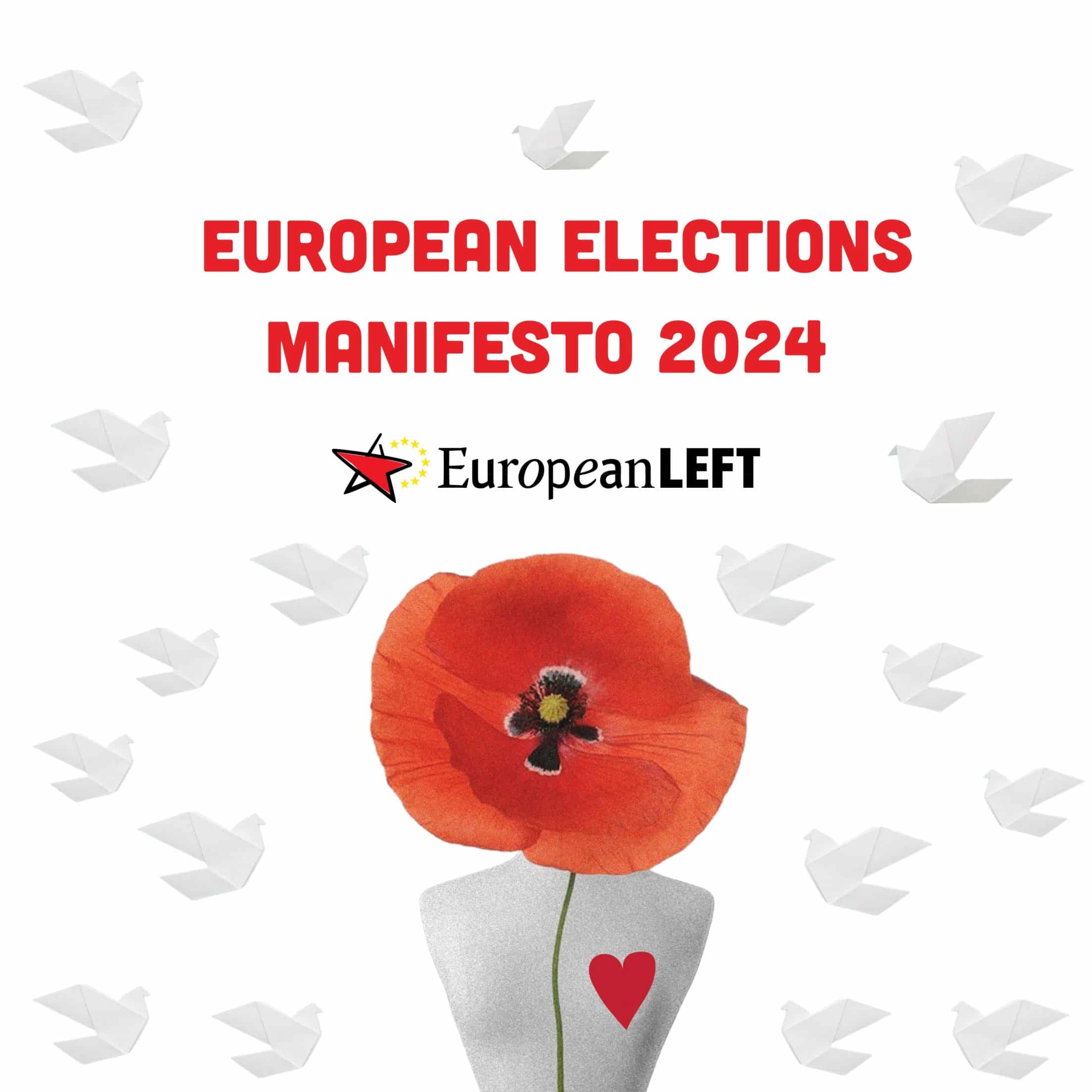
EUROPEAN ELECTIONS
MANIFESTO 2024
Principles and Proposals of the European Left Party
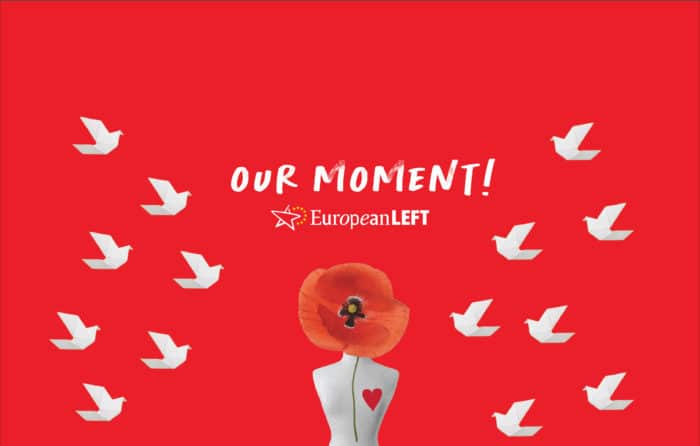
The upcoming elections to the European Parliament will take place under extraordinary circumstances. Europe has become the fastest warming continent in the world and the phase-out of fossil fuels must be accelerated. Many European citizens are struggling with a cost-of-living crisis while billions of euros are being spent in the EU on an unprecedented military build-up, and a return to the failed policies of neoliberal austerity is even on the horizon. Finally, the elections are being overshadowed by wars taking place on European soil and in its near vicinity.
These elections are therefore not second-order elections. If you want your voices to be heard, we call on all democratic European citizens, who form the social majority, to participate and vote in the European elections for a democratic, peaceful social, and ecological Europe.
The extreme nationalist and neo-fascist right, which is already governing in some countries and is knocking on the doors of power in others, can and must be stopped. Fighting fascism in whatever form it appears is a core element of the programme and history of the Party of the European Left (EL). These ideas must be combated and uprooted from our societies. This struggle can be won if the interests of the people and the desire of Europeans for social justice, ecological security and peace are placed at the heart of political decision-making.
Fighting Neo-Fascism
Our parties are rooted in the fight against fascism and war. We find strength in that fact, and we will also build upon and extend the hard-won victories of today, in Latin America and elsewhere, where the people are mobilising for a different vision of society and defeating hate and fear.
Anti-fascist and left forces must build international cooperation to support and popularise this vision – and to reject the growing anticommunism that goes hand-in-hand with the rise of the far right. Less socialism will mean more fascism and more barbarism.


We
propose
the following initiatives:
- Full implementation of the European Parliament Resolution on the increase in neo-fascist violence and a ban on all neo-fascist and neo-Nazi organisations and foundations;
- Building of a European anti-fascist centre for documentation, scientific research and education;
- Declaration of 25 April as European Day of the Fight against Fascism.
Our victory is peace!
Now more than ever we need to adopt a broad concept of security that addresses the existential threats we are facing – climate change, poverty, and war.
We condemn Russia’s military aggression against Ukraine, which is a crime under international humanitarian law. The immediate steps to stop the war must be a return to the negotiation table, a ceasefire, and a withdrawal of all Russian troops from Ukraine. We are in favour of peace negotiations. We are in favour of sanctions against the Russian military-industrial complex. We call for sanctions against the US military-industrial complex for supporting the aggression by the government of the state of Israel.
Israel must end this barbaric war and the violence in the West Bank. We have condemned the Hamas massacre of 7 October. We call for an immediate ceasefire, the provision of humanitarian aid to the people of Gaza and Israel’s immediate withdrawal from all the territories it occupies.
Israel must implement the judgement of the International Court of Justice, which obliges it to refrain from any action that could lead to genocide in Gaza. For this reason, the EU must apply effective economic and political sanctions to put pressure on the Israeli government.
We stand with the left and progressive forces in Israel in calling for an end to the war.
The world can no longer tolerate the systematic oppression of the Palestinians. The Palestinian people must be granted the right to self-determination in an independent, viable state alongside Israel within the 1967 borders.
Alongside the suffering in Ukraine and Palestine, we must not lose sight of the 22 other wars that are being waged around the world: in Yemen, Syria, Sudan, Western Sahara, against the Kurdish people and elsewhere. We are living through a ‘world war in instalments’, which could rapidly escalate into a worldwide nuclear disaster. Preventing this is the most important task.
We do not want Europe to become the arena of a new Cold War and an arms race. We want Europe to take responsibility for its security autonomously and independently of the USA, based on multilateralism and respect for international law. We are working for a Europe of peace and solidarity, constantly advocating diplomatic solutions for international conflicts. We need a new approach to security, based on the recognition that no state or community can be secure unless others share the same level of security. Instead of militarising the EU, Europe needs a political agenda for peace, security, and disarmament.
We continue to speak out against the expansion of NATO and the new arms race in Europe.
The 50th anniversary of the 1975 Helsinki Conference on Security and Co-operation (OSCE) is an opportunity to recall and revive the concept of common security in the European house.
Neutrality and non-alignment can become role models for a peaceful European security order.

Our proposals for immediate action:
- Include the rejection of war as an instrument for the resolution of international disputes as one of the fundamental principles of the EU;
- End the arms race in Europe: No new nuclear arms in Europe. Make Europe a nuclear weapon free continent!
- Fully implement the Treaty on the Non-Proliferation of Nuclear Weapons (NPT), sign and ratify the Treaty on the Prohibition of Nuclear Weapons (TPNW) and reduce the percentage of GDP going to military expenditure;
- Respect the ‘Irish Clause’ (Art. 24 and 42 of the Treaty on European Union): the common security and defence policy of the Union ‘shall not prejudice the specific character of the security and defence policy of certain Member States’;
- We support the aspirations of the Irish people to reunite their nation divided by British colonialism;
- We call for an end to the Turkish occupation of Cyprus and the reunification of the country according to the UN resolutions and the European Union acquis;
- We call for the demilitarisation of the island, and respect for its nonaligned status.
Social transformation towards an integral ecology
The European Left recognises the climate crisis as an emergency and is committed to transforming the economy away from unlimited growth and dependence on fossil fuels, thus creating the conditions for a just green transition that ensures job creation, fair distribution of wealth, sound and universal public services and public ownership of the commons.
We need to undergo significant social and economic transformations to reach the Paris Agreement targets and thus guarantee that the next generation will still have the right to a sustainable future on a healthy planet. We need to promote a new green social contract based on justice and respect. Justice is about the inalienable right of every citizen to live in a clean and healthy environment. Respect is about our minimum duty towards nature and towards future generations.
Wars and the global arms race are key factors influencing the environmental crisis. Peace is therefore key to this socio-ecological and eco-social transformation.
The Left have a clear concept of this ecological, energy, and industrial transformation. While technology will play an important role, this transition relates above all to a societal transformation of how we produce and consume, adapted to the real needs of the population and to the limits of the planet. Radical environmental change goes hand-in-hand with the fight for social justice and the fight to combat market domination for a just transition towards green economies.
The creative capacities of the working classes are the key to tackling the ecological and social crisis. We support the trade unions’ concepts of a democratically conceived just transition to a new digitalised and ecological economy that leaves no-one behind.
No worker should end up unemployed because of the ecological and energy transition which, alongside a reduction in environmentally harmful jobs, must bring the expansion of other, green forms of employment. We therefore demand massive European investment plans so that companies and public services can create new jobs and train the people for them. Achieving the Paris climate goals is imperative.
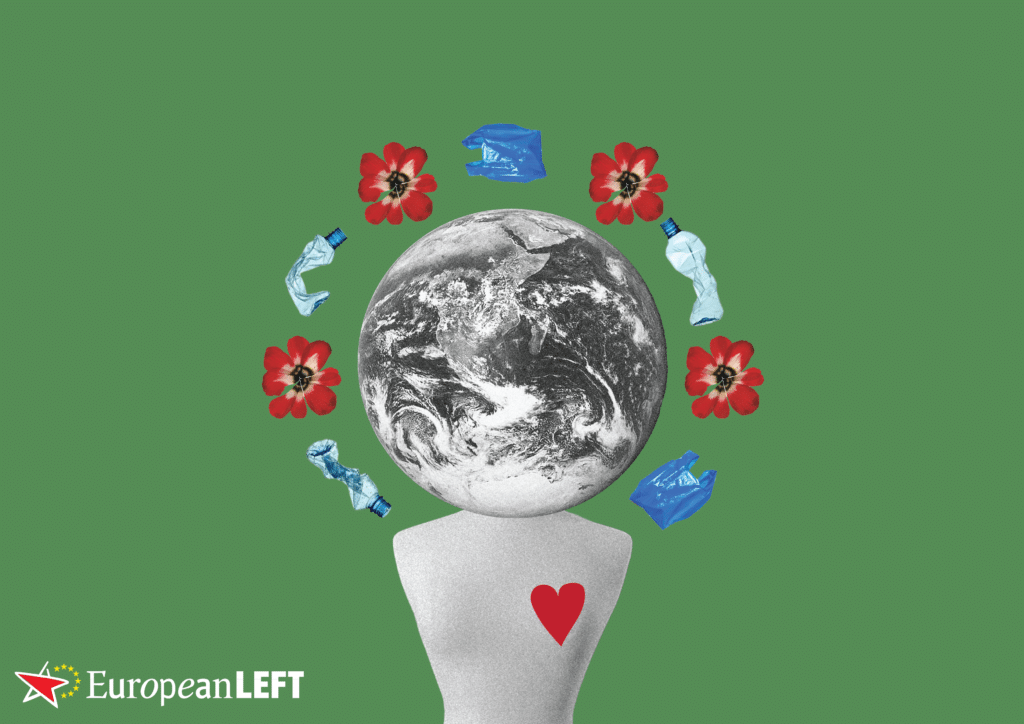
The European Commission’s ‘European Green Deal’ has set the target for counteracting climate change and initiating an ecological turnaround. Nevertheless, it remains stuck in a framework of reconciliation with the capitalist system of production that must be overcome. A stronger momentum and a different perspective are needed. The Left aims to contribute to the emergence of a progressive movement with the primary vocation of overcoming neoliberalism and a capitalist system that exploits nature, women, and men.
We are seeking to change the EU’s Common Agricultural Policy with the aim of gradually abolishing the system of allocating funds according to area and redirecting them towards environmentally friendly, sustainable agriculture. Sustainable agriculture should contribute to the attractiveness of rural areas, while labour-intensive agriculture must directly benefit those who work the land, promoting a model of small, sustainable farms and healthy food in which products have a short commercial circuit.
Public control and ownership of common goods and services with democratic and participatory planning of the economy are essential to save humanity and the planet and to end social inequality.
Women’s empowerment and leadership, together with their access to decision-making on equal terms, is an essential key factor in a just transition.

Our proposals for immediate action:
- Increase the European Union’s target for reducing greenhouse gas emissions from 55% to 65% by 2030 and bring forward the date for the European Union’s climate neutrality from 2050 to 2035;
- Establish public control and ownership of common goods such as water, sanitation, and the companies that provide them; of hydrocarbons and other energy sources; and of energy production, transmission and distribution services. Reversal of the current energy union model in favour of a model based on public ownership of resources, opening up a funding channel for municipalities to achieve energy sovereignty;
- Incorporate criteria of economic rationality into water management, considering cost recovery, including environmental costs and scarcity value, and taking into account social, environmental and economic impacts, as well as geographical and climatic conditions;
- Establish an agro-ecological policy model for the Common Agricultural Policy (CAP) based on an environmentally sustainable agriculture, ensuring fair incomes for farmers and providing quality food, soil protection, and food sovereignty as well as mitigating climate change;
- Implement the Sustainable Mobility Directive for sustainable spatial planning, emphasising public transport and resisting privatisation;
- Create a European Fund for public services, financed at 0% by the ECB, with democratic governance, for investment, massive recruitment and training, particularly in transport (freight and passengers), healthcare, and education;
- For the ecological and social transition of firms’ production: change the banking policy of the ECB: low rate (0%, or less) for bank loans for investments that reduce carbon emissions and create good jobs; high rates, even penalty rates, for loans that cut jobs, relocate or increase polluting emissions (CO2, etc.);
- Dismantle the SUV economy through regulations that ensure carbon-neutral, efficient, and road user-friendly car production. Impose equal taxes on aircraft and car fuels, eliminating CO2 exemptions. Ban private flights, prioritise trains for journeys under two and a half hours, revive night trains, and expand networks as needed. Enforce reduction and oversight of cruises;
- Integrate biodiversity into all sectoral policies, in particular energy, agriculture, fisheries, forestry, transport, tourism and land-use planning, as a key cross-cutting element that should constrain action when it becomes threatened.
Fight poverty, not the poor!
We will not resign ourselves to the increase in poverty in Europe. We call for the adoption of an integrated anti-poverty strategy that tackles the multidimensional problem of poverty and social exclusion.
The rise of gentrification and the rapid expansion of the platform economy in real estate and tourism deprive citizens, and especially young people, of their right to decent and affordable housing. Moreover, the current number of homeless people is alarmingly high, while thousands of buildings stand vacant, particularly in metropolitan areas.
Decent, affordable, and climate friendly housing must become a right and not be viewed as a commodity.
Social protection cover for health, pensions, and unemployment must be universal for all people in the EU, wherever they come from.
We advocate universal and free access to health care and the strengthening of public health systems to reduce social inequalities. Public resources should be used only to create and strengthen public health systems.
We call for basic energy security, that is, the legal right of all people to have free access to the amount of energy they need for heating and household purposes.
This is a human right.
Feminist economics and gender equality are fundamental to a human economy; they are a core component of the new, fairer, human economy we want to achieve.
It is now time to address and fully recognise the role of unpaid and underpaid care work. Society must invest in public care systems and address the disproportionate responsibility for care work borne by women and girls, supporting its defamilialisation and tackling women’s poverty.
We want to build modern public services that are sufficiently staffed, de-bureaucratised, democratically and transparently managed and responsive to citizens’ needs.
The EU must promote investments in free and accessible healthcare, education, transport, and telecommunications.

Our proposals for immediate action:
- Enshrine the right to affordable, decent housing for all people in Europe in EU primary law;
- Implement national and European investment plans for public housing and reconstruction of the public infrastructure; financing of social housing projects by national or local authorities, non-profit developers and cooperatives through the European Investment Bank (EIB) at 0% interest;
- Adopt an EU directive obliging Member States to introduce legal rent caps and prohibit fixed-term tenancies and forced evictions from primary residences; strengthening of tenants’ rights in apartments owned by housing investors. These investment companies and their activities must be limited so that they do not pose an undue risk to housing markets;
- Exempt public housing funding from internal market and competition rules;
- Create quality care structures for children, the elderly and the disabled in order to enhance the sustainability of reproduction in an equitable manner;
- Adopt an EU directive that caps rents and obliges local authorities to provide housing for students and learners; a regulatory framework for short-term rental platforms in major urban areas coupled with public expenditure and European funds for the development of new homes;
- Adopt an EU directive against social inequalities and discrimination in education based on class, gender, sexual orientation and gender identity or expression, nationality, residence status, and religious belief;
- Halt the privatisation of education, higher education, and research; only public funding for public institutions;
- Reserve 7% of EU GDP for education, research, and innovation;
- Abolish admission tests and tuition fees (including for non-EU and non-European students);
- The allocation of European study and research grants should be based on social criteria promoting European exchanges in training courses from secondary to university level;
- Ensure universal and free access to care and public health systems, including contraceptive services and safe abortion throughout the EU, guaranteed by EU primary law;
- Create a European public pharmaceutical/medical hub;
- 2% of EU GDP to be allocated to supporting culture;
- Adopt a basic European statute for intermittent artists.
Money and funds for people and the planet!
In order to safeguard and develop public services and enable a just transition to a digitalised and green economy, we must first prevent the reintroduction of austerity. Our priority is a massive investment spending plan for the creation of green jobs, based on the revitalisation of SMEs and essential public services, the care economy, and the transformation of industry, transport and energy in line with the needs of the population and the limits of the planet.
This requires mobilising financial resources that exceed the EU budget and the NextGenerationEU development fund many times over. These funds could be made available if we manage to form a willing, progressive majority within European institutions.
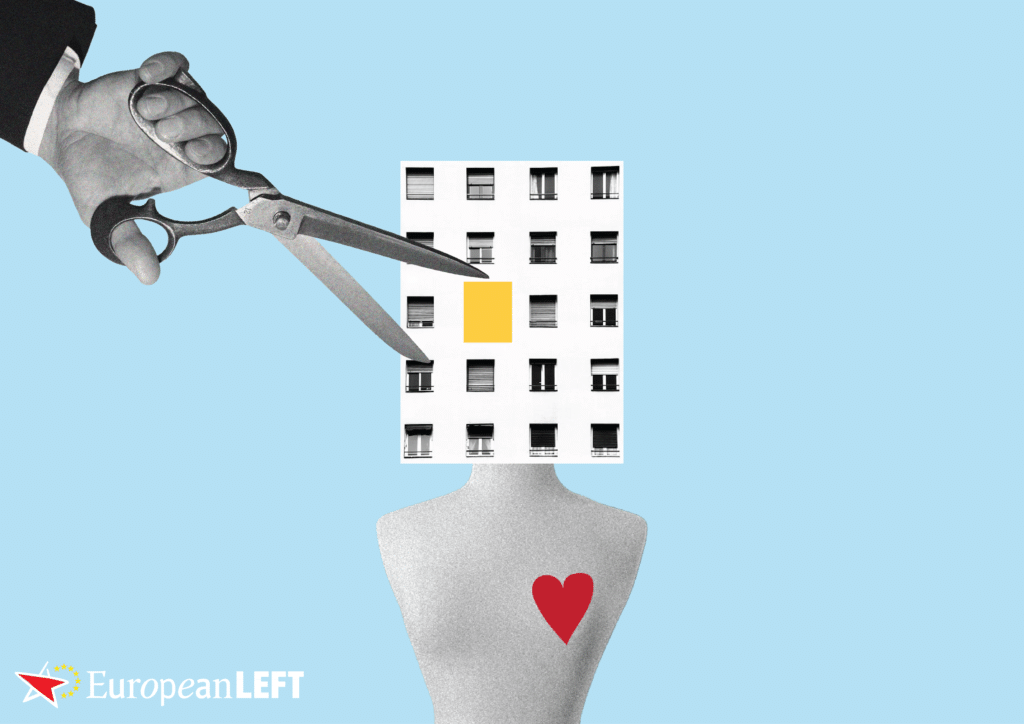
Public budgets must be freed from the stranglehold of the financial markets.
We call for the redistribution of a large part of the billions of euros that Europe today spends on armaments towards projects for social and ecological transformation.
The energy companies have reaped huge profits from the price increases due to the war in Ukraine, and these need to be given back to society.
We call for the abolition of tax havens in the EU and the establishment of a common minimum level of taxation of profits and large assets in the EU.

Our proposals for immediate action:
- Abolish the Stability and Growth Pact and replace it with a new pact focusing on social and environmental restructuring, allowing for expansionary and counter-cyclical policies;
- Transform the Recovery and Resilience Facility (RRF) into a permanent EU mechanism to reduce inequalities and promote sustainable economic growth, with a focus on supporting and modernising SMEs;
- Bring in a European tax on the wealthy to fund essential investment for poverty reduction and environmental and social transitions. Impose a windfall tax on excessive profits in the energy and war-related industries, such as banks and the arms sector. Introduce a progressive cloud tax on digital platform revenues, covering expenditure by corporations and political parties on social media;
- Make the ECB an instrument that provides direct financing to the states to strengthen public institutions and bodies in meeting the needs of public rights and services and ecological transformation. Create a European Fund for public services, financed at 0% by the ECB, with democratic governance, for investment, massive recruitment and training, particularly in transport (freight and passengers), health and education, research and for financial advances in social protection;
- Change the banking policy of the ECB: low interest rates (down to 0% or less) for bank loans for company investments that reduce carbon emissions and create good jobs; high interest rates, even penalty rates, for loans that cut jobs, relocate, increase polluting emissions (CO2, etc.) or are dedicated to speculation;
- Approve a debt restructuring programme that includes the monetisation of public debt acquired by the ECB, with retrocession of interest in exchange for social conditionality so that the additional flows resulting from the restructuring are used to improve the social cohesion and welfare indicators of the population and to promote sustainable development policies. Moreover, the financing of public spending programmes and the creation of good jobs should form part of the ECB’s objectives;
- Tax financial transactions and combat tax evasion and fraud by drawing up an accurate list of tax havens, including those within the EU, and introducing a withholding tax on the profits of multinationals and banks. We must put an end to tax havens within the European Union!
- Create a European Fund for social housing, public services and employment needs, financed by the ECB’s money creation, and lending to states, municipalities, cooperatives and non-profit institutions at zero or very low interest rates. The fund must be managed with transparency and guaranteed through the involvement of civil society, especially trade unions, women’s associations, tenants’ associations and ecological movements.
Transforming labour
We want to build a united left and progressive front in Europe capable of changing the current power relations by empowering workers and trade unions to shape the future EU. We want a new green social contract that meets the challenges of the 21st century and aims to reduce inequalities. Together with left trade unionists, we have drawn up 16 demands that form a basis for common action.
Our political goal is to use the huge increase in global labour productivity to improve people’s lives by reducing working hours without loss of pay, and to redirect production towards social and environmental needs.
The EU must address the cost-of-living crisis by increasing wages and pensions above the rate of inflation, with particular emphasis on eliminating inequalities. The EU needs to increase wages and close the gender pay gap. This requires strong trade unions. We support the universal right to organise, to bargain collectively and to take industrial action, including strikes, at European level.
Wage earners, workers and the working class must be empowered to become protagonists in building the new socially just and ecologically responsible Europe through the creation of new rights. Economic democracy is the key to enabling working people to intervene in what and how they produce.
Together with the trade unions, we are fighting for a just transition to human-centred digitalisation.
We need to address the challenges of artificial intelligence (AI) in a socially just way. Workers have the right to be involved in defining the social and environmental goals of companies and public services.
Workers in the platform economy must be identified as workers.
We fight against precarious work and for the right of every worker to a stable, permanent contract and a full-time job.
The majority of workers in the care economy are women. The EL is committed to fighting, together with the trade unions and the feminist movement, for socially and financially decent work for women.

Our proposals for immediate action:
- No more working poor! A European Basic Income Directive that obliges Member States to legally guarantee everyone a minimum income that covers the basic needs for a decent life (food, housing, energy, access to culture, funds for emergencies, etc.);
- Approval of a Guaranteed Employment Plan in the European Union, which would focus on programmes for reforestation and environmental protection, housing renovation and energy efficiency, promotion of care, training/employment for the unemployed and social economy initiatives that create jobs. It would be financed by the European Stability Mechanism (ESM) and conditionality would be linked only to the creation of quality public jobs;
- An EU legal framework for a just transition in the world of work through the anticipation and management of change based on collective bargaining and trade union involvement;
- An EU regulation guaranteeing the legal right to permanent contracts and full-time work and banning unpaid internships. Social rights and labour rights must be fully enforced in platform work and telework;
- Migrant workers should be welcomed on equal terms and working conditions;
- The EU must establish a Social Progress Protocol in primary law, giving priority to workers’ and social rights over the freedom of the single market;
- Amend the Working Time Directive with the aim of reducing working hours for the same wage.
Empowering Democracy in AI and Innovation
We welcome the European Parliament’s attempt to regulate the use of artificial intelligence (AI) and support the ban on biometric surveillance, emotion recognition and predictive policing by AI systems. However, the EP’s draft focuses on market-based regulation and thus misses the essential issue: the need for transparency and accountability (democratic and societal control) of technological innovation with regard to its social and environmental impacts.

Our proposal:
- Effective regulation of AI with the humans-in-control principle must be incorporated into EU law;
- Any regulation of AI by the EU must take into account the impact of AI on the world of work and social systems, and exclude possible discriminatory uses of AI or racially-biased systems;
- The introduction of AI in high-risk areas and mega-data transactions must be identified and prohibited;
- The use of AI in weapons systems must be prohibited;
- The controlled introduction of digital technology in education must respect and enhance the work and status of teachers, avoid exacerbating social inequalities, and limit negative impacts on the environment;
- Public and private services are rapidly being digitalised. The whole population cannot keep up with this rapid development and there is a risk of digital exclusion. The elderly, people with disabilities and all those in need must be guaranteed adequate user support and access to the necessary equipment to prevent exclusion.
The feminist perspective. Women’s rights are human rights.
The Party of the European Left considers feminism fundamental to building a Europe of peace, self-determination, freedom, and equality, free from violence against women.
In war, we see the most extreme expression of patriarchal violence. The feminist ideal is therefore the logical antithesis to any kind of militarism and armament.
Left feminism offers a profound critique of capitalist and patriarchal society by proposing an alternative to the economy based on the exploitation of human beings and nature, namely an economy based on life.
The European Left demands equal opportunities for women. It wants to put an end to the inequality that women suffer in Europe simply because they are working women.
We denounce the persistent gender pay and pension gap and fight for the recognition and redistribution of care work, which still falls almost exclusively on women’s shoulders. We demand the promotion of public care systems.
We oppose all forms of oppression based on class, gender, ethnicity, colour, gender identity or expression, sexual orientation, disability and age. It is this emancipatory perspective that distinguishes it from the liberal feminism currently dominant in the European institutions.
The European Left defends the right of women to make autonomous decisions about motherhood and their bodies.
It demands that the right to universally accessible contraceptive services and safe abortion be guaranteed by the European Treaties throughout Europe.
Together with feminist movements, we fight against the sexist violence and machismo that women suffer throughout their lives and demand a comprehensive legal and political framework to deal with gender-based violence in all its forms.
The EL wants to make a feminist perspective the criterion for the EU’s economic, environmental and social policies, as well as in health, education and culture.

Our proposals for immediate action
include demanding:
- EU accession to the Istanbul Convention on preventing and combating violence against women and domestic violence; there is a need for a comprehensive EU policy framework to eliminate all gender-based violence in all European countries;
- Recognition of the term ‘femicide’ in EU and Member State legislation and adoption of a common definition of rape in the EU;
- Guaranteed decent work for women – targeted policies to ensure equal opportunities for men and women;
- Immediate transposition of the EU Equal Pay Directive into national law in all Member States;
- Increased and guaranteed pensions for women;
- An EU Directive requiring EU Member States to provide access to antenatal and maternal health services, voluntary family planning and free, safe and legal abortion.
For an end to discrimination and for the full inclusion of LGBTQIA+ people:
- We campaign for the fundamental rights to marriage and parenthood for all couples, and to ensure that the rights of same-sex couples and their children are recognised across the EU;
- We advocate for the depathologisation of trans identities and gender self-determination, as well as a guarantee of recognition of these identities and access to treatment for the free development of these identities throughout the EU;
- Legal recognition of LGBTQIA+ identities must be included as a ground for asylum;
- Anti-discrimination laws need to be promoted and hate speech defined in order to be effectively addressed.
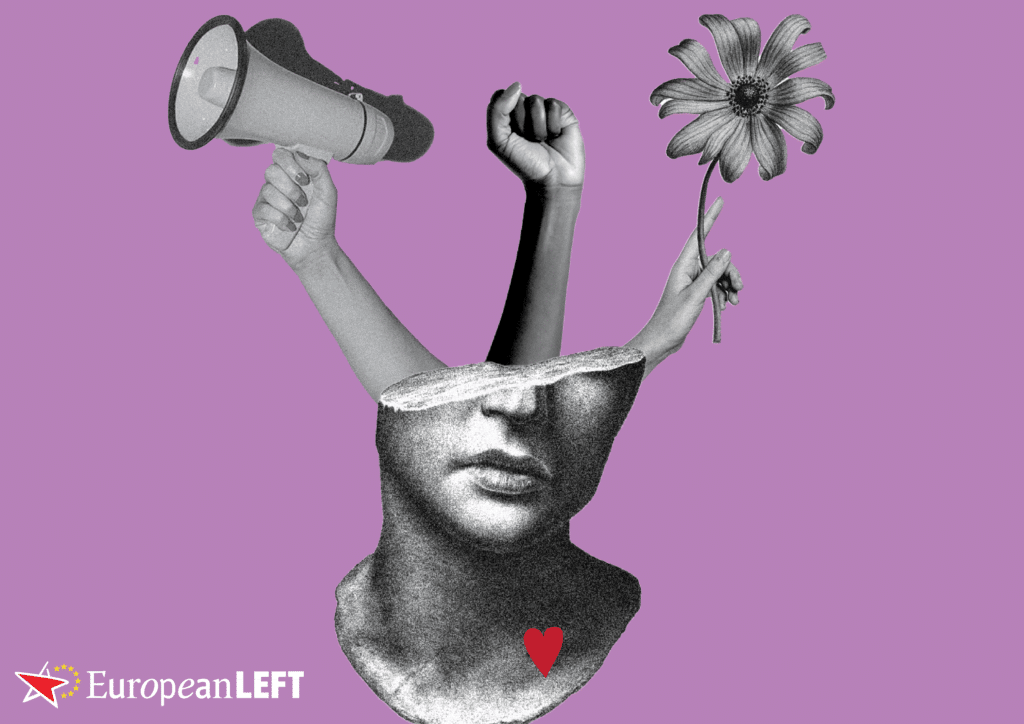
Co-development not colonial domination and hegemony
Today’s globalised world shows that national antagonisms and European isolationism are illusions. The Covid-19 pandemic, with 6 million deaths worldwide, has highlighted the importance of international action in the face of today’s crises. The EL, together with governments of the Global South, trade unions, NGOs and church organisations, has called for global cooperation in the fight against pandemics and for vaccines to be declared a common good of humanity.
The European Union must define its place in the emerging multipolar world and promote the non-use of force in international relations. It must promote cooperation between sovereign states based on equality and the renunciation of hegemony.
We want the EU to work for the democratisation of international institutions:
the World Bank, the International Monetary Fund and, above all, the United Nations, which must be re-founded in order to abandon the current model, which has been a response to the Cold War of the 20th century, and make way for a multilateral model which, among other things, extends the powers of the General Assembly to the benefit of the majority of states, allows for greater participation by civil society and strengthens the agencies of the UN by enhancing the powers of the General Assembly in the interest of the majority of states. EU trade policy must reject the neoliberal system of free trade agreements and the privatisation of services.
We call on the EU to break with its neocolonial style of domination and relaunch its trade and financial relations with the Global South on a new basis; specifically, we propose that relations with Latin America abandon the neoliberal logic and obscurantism of FTAs in order to establish a cooperation among equals that is transparent, sustainable and, above all, of mutual benefit. We want the EU to oppose the misuse of the international financial system as a weapon in the new Cold War and instead uphold multilateralism in the EU’s economic and trade relations, supporting the de-dollarisation of international trade and the creation of a common world currency to put an end to the unilateral domination of the US dollar and a transformation of the IMF.
We want to stop Frontex
Fortress Europe has been waging a war against migrants and refugees for decades, causing violence, suffering and torture, with thousands of victims in the Mediterranean and along the Balkan route, and thousands of deportations. We want to stop Frontex, the externalisation of borders, the relocation of detention centres to non-EU countries, the funding of bloodthirsty regimes, and the administrative detention of those deemed unfit to remain in the EU. The New Pact on Migration and Asylum, signed on 20 December 2023, must be cancelled because it condemns refugees to detention and, in most cases, deportation. We are working for a Europe without cages and barbed wire, one that acts not as a wall but as a bridge to other continents and the people who live there.
We call on the EU to base its international policy exclusively on the UN Charter and UN resolutions instead of building up military capacities for worldwide interventions following NATO’s instructions and resolutions.
The EU’s migration policy must respect international law. We support the creation of safe, legal and regular migration channels and improved protection, rights and assistance for migrants and asylum seekers. If the EU wants to reduce the number of refugees and migrants then it needs to promote peace, stability and sustainable development in the Middle East, sub-Saharan Africa and South Asia instead of participating in military interventions, fuelling civil wars and exploiting natural resources.

Our proposals for immediate action:
- We call for a break with ‘Fortress Europe’ – we stand for legal and safe migration routes and oppose the policy of illegal pushbacks. The EU must develop and implement a truly European migration and asylum policy, based on co-responsibility and obligatory solidarity between all Member States. A migration policy defined by the creation of safe, legal passages, in order to combat the extensive trafficking in human beings and stop human losses in the Mediterranean. An asylum policy that respects the Universal Declaration of Human Rights and the Geneva Convention on the Status of Refugees. We demand the abrogation of all agreements and declarations on migration and refugees that violate these fundamental rights, including agreements on the externalisation of European borders, and their replacement with a common reception system in the European Union based on criteria of inter-territorial solidarity and respect for the rights of migrants and refugees;
- We call for a Council Directive on implementing the principle of equal treatment between persons irrespective of religion or belief, disability, age or sexual orientation;
- We demand the abolition of the Dublin Agreement, and the dissolution of Frontex;
- We demand the cancellation of the EU’s Free Trade Agreements (FTAs) with the countries of the Global South and their replacement with new international agreements, trade control and investment treaties for co-development and public goods that respect industrial and agricultural sovereignty, fair trade and social and environmental development, promoting the consumption of locally produced goods and short distribution channels. This must be done in an independent manner, without subordinating these relations to the geopolitical interests of the USA and NATO;
- We call on EU Member States to cancel the Covid debt of countries in the Global South. A general public audit of illegitimate, coerced debt should be introduced;
- A European Fund for ecological and social co-development, financed by the ECB, must be set up to establish new relations with the countries of the South. Workers’ representatives from the countries concerned must be able to participate;
- We call on the EU to commit to an immediate and massive multiannual issue of SDRs (Special Drawing Rights) for the ecological transition and the response to the social crisis, allocated according to the needs of each country, and to an overhaul of voting rights within the IMF, based both on a country’s GDP and on the weight of its population in the world;
- The world must recognise the danger threatening the Armenian people. We demand the cancellation of the gas contract between the EU and Azerbaijan. The energy argument must not be an argument against the basic human rights of the Armenian people;
- In line with the annual vote of the UN General Assembly for the past 30 years, we call on the EU to take action against the USA’s economic, financial, and trade embargo against Cuba, and its extraterritorial application, as well as its immediate removal from the list of countries promoting terrorism;
- The EU must call on the repressive regime of Turkey to stop its aggression against the Kurdish people. It should condemn Morocco’s occupation of Western Sahara, its attacks and human rights violations against the Saharawi people and its military aggressions against the territories liberated by the Polisario Front and the Saharawi refugee camps in Tindouf, and support a referendum on self-determination for the Saharawi people in line with UN resolutions;
- The Euro-Turkish negotiations for the revision of the Customs Union must be used as a means of placing pressure on Turkey for a joint appeal on the part of Greece and Turkey to the International Court of Justice on issues of the continental shelf and the EEZ.
Let’s dare to do democracy!
We are in favour of a thorough public debate on the future of the EU, involving national parliaments, the European Parliament and civil society.
The recent ‘Conference on the Future of Europe’ concluded its work with a call for a revision of the European Treaty in the direction of democratic participation, transparency, accountability and social cohesion.
We are fighting for a new EU that prioritises an ecologically sustainable economy, employment, and the welfare state, overcoming economic and social disparities between Europe’s regions and advocating equality between men and women – instead of the single market and so-called ‘monetary stability’.
We continue our struggle to overcome the crisis of the EU and to build a truly democratic union of the European people.
Although we are fighting for reforms within the legal framework of the EU, we believe that it is the current EU treaties that stand in the way of radical social and ecological transformation and the effective and democratic sovereignty of the people. We therefore call for an independent, solidarity-based, participatory and democratic re-founding of the EU.
The rule of law, women’s rights and democracy are values that must be applied and enforced throughout the EU.
We likewise defend the right of the parliaments and governments of Member States to reject anti-social, neoliberal measures when they are imposed.
The new EU must respect the sovereign self-determination of the European peoples, who cooperate with each other as equals. Policy areas of shared competence must be democratised, with the directly-elected European Parliament and the national parliaments playing the central role. We also recognize the existence and the rights of peoples without states.
Europe is more than the EU. European security and cooperation require the strengthening of pan-European institutions such as the Council of Europe and the OSCE.
The EU has set clear criteria for its enlargement policy, which must not be watered down: States can only become members of the EU if they respect human rights, the rule of law and the social and political rights of their populations, including minorities. Enlargement must not be an instrument for deepening rifts within Europe and increasing military tensions. It must not assign the accession countries the role of suppliers of cheap raw materials, agricultural products, and cheap labour as it is doing already now. This is good neither for the working people of the accession countries nor for those of Member States. In contrast, it must focus on safeguarding democracy and the rule of law and boosting social cohesion in candidate and Member States.
We believe that the right of universal suffrage can enable immigrants to actively participate in the commons, and the right to vote from 16 years of age would be a good first step towards strengthening democracy and participation.

Our
positions:
- The new treaties must define anti-fascist and anti-Nazi values as the foundations of the Union;
- The directly-elected European Parliament must have the right to initiate legislation, to propose laws, to elect the European Commission, to propose and decide on the EU budget and to control the activities of the European Central Bank;
- While the European Parliament has no competence in Common Foreign and Security Policy, we reject the abolition of the unanimity principle in the European Council in these matters;
- We support the aspirations of the Irish people to reunite their nation divided by British colonialism.
Our party has the ambition to be an instrument for a new unity of the Left in Europe across party lines, working for the convergence and common action of all progressive and green forces. We offer our election manifesto for discussion and debate to all those who want to work for a democratic, just, feminist and ecological Europe based on a new paradigm of sustainable development.
